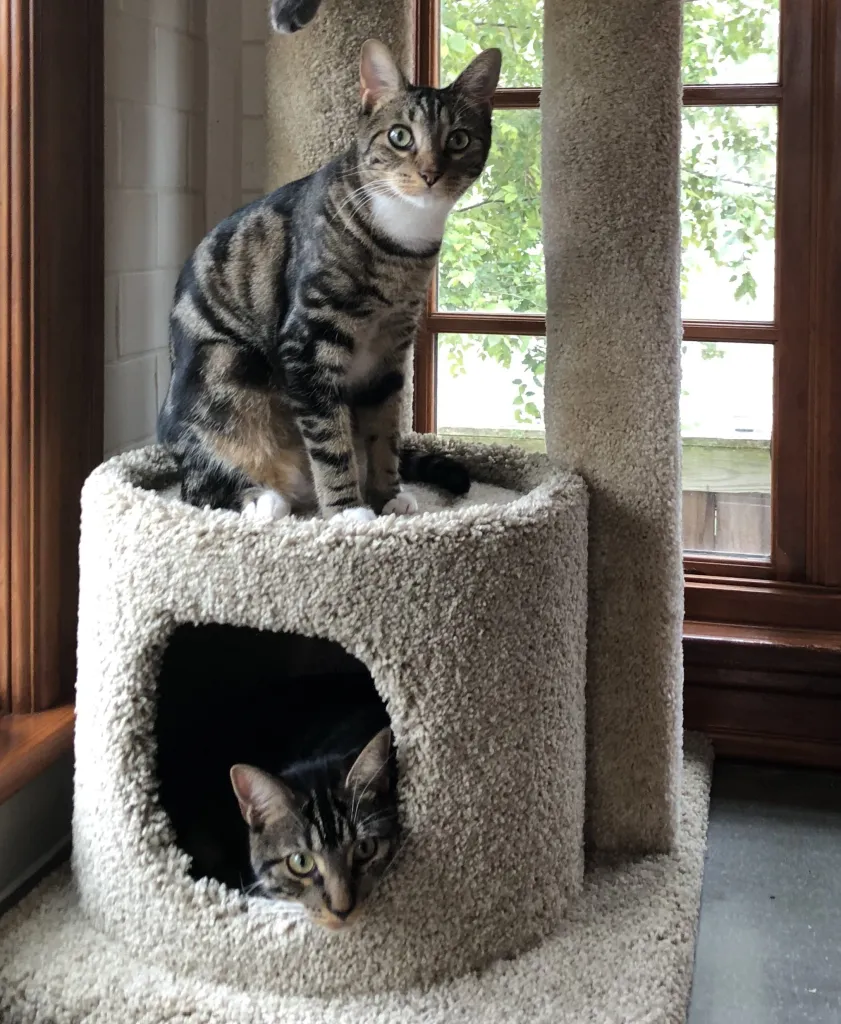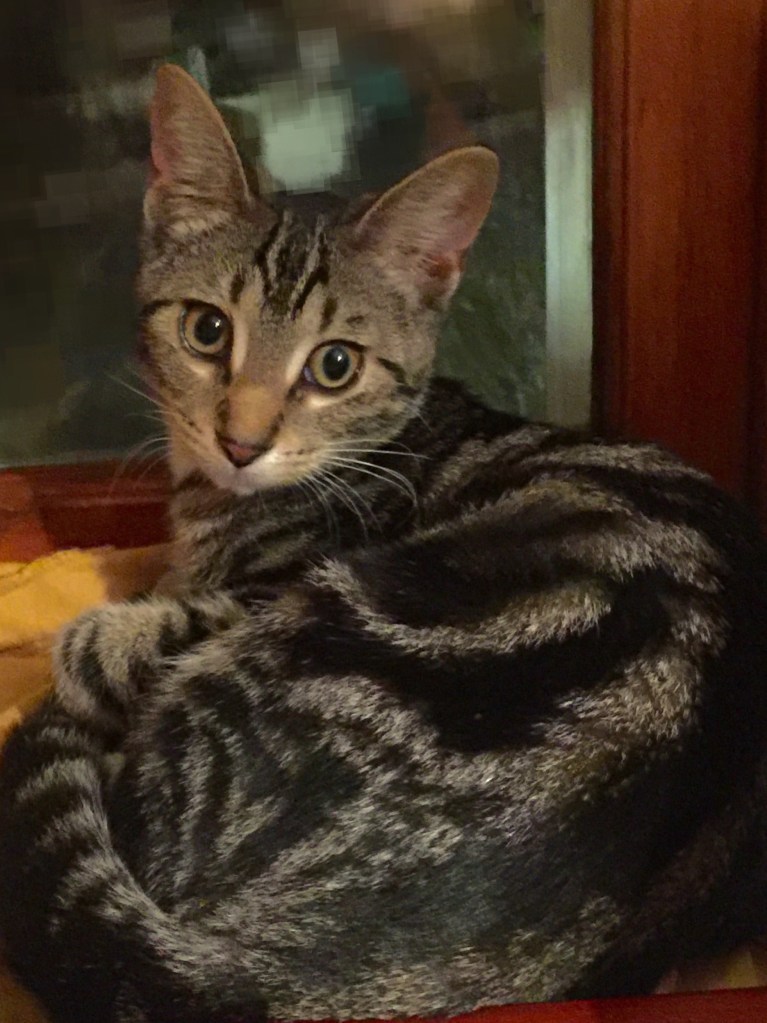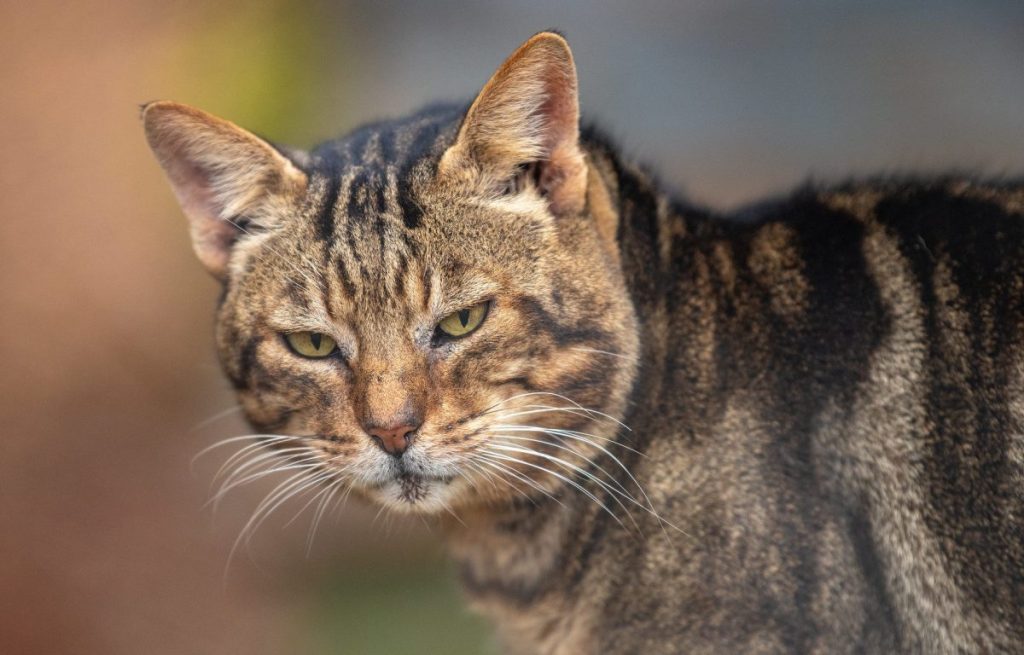The Sokoke is a cat breed known for their distinctive appearance, charming personality, and fascinating origin. Hailing from the coastal region of Kenya, East Africa, these cats have garnered attention for their wild appearance, resembling the elusive African wildcat. Despite this, they maintain the endearing qualities of a domestic companion. The Sokoke cat characteristics may be rooted in this wild sort of temperament. In particular, these cats adore climbing. They will happily scale any surface they can, and will happily perch in the highest place they can find. They are also very vocal and form deep bonds with their loved ones. This bond extends beyond their human companions. They often bond with their feline household siblings as well, which makes rehoming incredibly difficult for this breed.
The origins of the Sokoke cat trace back to the Arabuko Sokoke Forest, a coastal reserve in Kenya. Believed to have lived in the wild for centuries, these cats adapted to their natural environment, developing the distinctive coat pattern that helps them blend into the dappled sunlight and foliage of their native habitat. While they were once considered a rare and indigenous treasure, efforts to preserve and protect the breed have led to their introduction to the international cat community.
When considering a Sokoke, it’s advisable to prioritize adopting from rescue organizations or shelters to provide a loving home to a cat in need. However, if you decide to purchase a Sokoke kitten, it’s crucial to choose a reputable breeder. Conduct thorough research to ensure that the breeder follows ethical practices and prioritizes the well-being of their cats. Reputable Sokoke breeders prioritize the health and temperament of their cats, conduct necessary health screenings, and provide a nurturing environment for the kitties. This active approach ensures that you bring home a healthy and happy kitty while discouraging unethical breeding practices.
Quick Facts
- Origin: Arabuko-Sokoke National Forest, Kenya
- Size: Medium
- Breed Group: Shorthair
- Lifespan: 15-20 years
- Coat: Short, dense, and coarse with a “wood grain” pattern, typically in shades of brown, brown tabby, or silver tabby
- Temperament: Intelligent, playful, affectionate, loyal, active, independent
- Exercise Needs: Moderate to high
- Training: Easy to train, enjoys learning tricks
- Grooming: Weekly brushing
- Health: Generally healthy, but some potential for genetic health conditions.
- Sokoke cats are nearly extinct in the wild.
- This is one of the rarest domestic cat breeds in the world.
- Sokoke cats have a tip-toe gait, due to their longer back legs.
- They were initially given the name “Kadzonzo,” which translates to “looks like tree bark.”
Sokoke Cat Pictures


-
Affectionate with Family
Some cat breeds are typically independent and aloof, even if they’ve been raised by the same person since kittenhood; others bond closely to one person and are indifferent to everyone else; and some shower the whole family with affection. Breed isn’t the only factor that goes into affection levels; cats who were raised inside a home with people around feel more comfortable with humans and bond more easily.

See Cats Less Affectionate with Family -
Amount of Shedding
If you’re going to share your home with a cat, you’ll need to deal with some level of cat hair on your clothes and in your house. However, shedding does vary among the breeds. If you’re a neatnik, you’ll need to either pick a low-shedding breed or relax your standards. This furniture cover can make it easier to clean up cat hair and keep it off your sofa!
-
General Health
Due to poor breeding practices, some breeds are prone to certain genetic health problems. This doesn’t mean that every cat of that breed will develop those diseases; it just means that they’re at an increased risk. If you’re looking only for purebred cats or kittens, it’s a good idea to find out which genetic illnesses are common to the breed you’re interested in.
-
Potential for Playfulness
Some cats are perpetual kittens—full of energy and mischief—while others are more serious and sedate. Although a playful kitten sounds endearing, consider how many games of chase the mouse-toy you want to play each day, and whether you have kids or other animals who can stand in as playmates. A classic wand cat toy like this one is perfect for playful felines!
-
Tendency to Vocalize
Some breeds sound off more often than others with meows, yowls, and chattering. When choosing a breed, think about how the cat vocalizes and how often. If constant “conversation” drives you crazy, consider a kitty less likely to chat.
-
Kid-Friendly
Being tolerant of children, sturdy enough to handle the heavy-handed pets and hugs they can dish out, and having a nonchalant attitude toward running, screaming youngsters are all traits that make a kid-friendly cat. Our ratings are generalizations, and they’re not a guarantee of how any breed or individual cat will behave; cats from any breed can be good with children based on their past experiences and personality.
-
Friendly Toward Strangers
Stranger-friendly cats will greet guests with a curious glance or a playful approach; others are shy or indifferent, perhaps even hiding under furniture or skedaddling to another room. However, no matter what the breed, a cat who was exposed to lots of different types, ages, sizes, and shapes of people as a kitten will respond better to strangers as an adult.
-
Easy to Groom
Some breeds require very little in the way of grooming; others require regular brushing to stay clean and healthy. Consider whether you have the time and patience for a cat who needs daily brushing. You should definitely pick up this awesome de-shedding tool for cats of any hair length!
-
Intelligence
Some cat breeds are reputed to be smarter than others. But all cats, if deprived the mental stimulation they need, will make their own busy work. Interactive cat toys are a good way to give a cat a brain workout and keep them out of mischief. This scratcher cat toy can keep your smart kitty busy even when you’re not home!
-
Pet Friendly
Friendliness toward other household animals and friendliness toward humans are two completely different things. Some cats are more likely than others to be accepting of other pets in the home.
Sokoke History
The story of the Sokoke has been pinpointed back to the Arabuko Sokoke Forest in Kenya. It’s believed that a couple of kittens were taken from Kenya to Denmark in the late 1970s, which helped bring the breed to Europe.
When a documentary maker named Jeannie Knocker started to research the breed in 2001, she wound up letting breeders in the United States and Europe know about the cat, which helped put the Sokoke firmly on the cat map.
The Sokoke was officially accepted for registration by the International Cat Association (TICA) in 2004. These days, you may find Sokokes in shelters or in the care of rescue groups. So make sure to consider adoption if you decide that this is the breed for you!
Sokoke Size
The Sokoke is a medium-sized cat. As is always the case, exact size standards might vary.
Most Sokokes weigh in at six to ten pounds. Many can be smaller or larger than average.
Sokoke Personality
In terms of the Sokoke’s overall personality, this is a feline who’s often compared to a dog. That means the breed is adept at being trained to learn tricks and will even have fun playing fetch games. Oh, and just like many canines, the Sokoke is often fond of playing with water!
Sokokes also have a reputation for being very loyal to the people they live with and often like to stick close to wherever the family is, whether that’s for lounging sessions or play times. You’ll need to ensure that your cat isn’t alone for long periods of the day.
This breed does best in a busy family environment where there’s always someone available for company or fun. As a final consideration, be aware that the Sokoke likes to be active and is very inquisative, so you’ll need to provide a living space where they can climb around to satisfy their instincts.
Sokoke Health
Sokokes are generally considered to be healthy cats; although, it’s always important to schedule regular wellness visits with your cat’s vet.
There aren’t any breed-specific health problems associated with the Sokoke, but always keep an eye out for signs that your cat might be in distress or pain.
Sokoke Care
As with all cats, it’s important to keep up your Sokoke’s regular veterinary checkups to detect any health concerns early. Your vet can help you develop a care routine that will keep your cat healthy.
Beyond scheduling yearly wellness visits with your vet, make sure that you pick up a scratching post for your Sokoke cat’s living environment. This can help promote healthy scratching and keep the cat’s nails in good condition. The cat’s ears should also be examined regularly for signs of dirt building up or possible infection. Talk to your vet about starting a regular teeth brushing regime that will suit your Sokoke. Your vet can advise you about specific brands and techniques.
Finally, because the Sokoke is a cat with lots of energy, it’s recommended that you add at least one cat tree to your home. This is also a cat who takes well to being walked on a leash, but make sure you take appropriate safety steps before adding the activity to your cat’s routine.
Sokoke Coat Color And Grooming
The Sokoke has a short coat, and their fur is usually described as being thin. They sport a brown tabby pattern that many owners like to say looks like the bark of a tree.
When it comes to grooming, the Sokoke is a low maintenance cat. Brushing the feline once a week should suffice and will help lessen the chances of any mats taking root. In terms of climate, most Sokoke cats definitely prefer a hotter rather than a colder environment. You should also always make sure that there’s enough shade and fresh water available during the hotter months.
Children And Other Pets
The Sokoke is generally a really good fit for families with young children. Just make sure that early socialization takes place and boundaries are properly set on both sides. Supervise early interactions between kids and cats.
When it comes to other household pets, the good-natured Sokoke usually fares well with many domestic animals. But always make sure to supervise early interactions between the new cat and existing pets. Sometimes these relationships are very much dependent on the individuals pets’ personalities. Ultimately, early socialization really pays off with this breed. Make sure to reward your Sokoke for good behavior when you bring them home to your family!
Sokoke Rescue Groups
It may be hard to find a breed specific rescue for Sokoke cats because they are a somewhat uncommon breed. However, you may want to try shelters and rescues that cater to all types of cats, including Sokokes, as well as your local shelter. Here are some nonprofit rescues you can try:
More Info For You
If you’re also looking for a dog, check out DogTime’s dog breed page!





